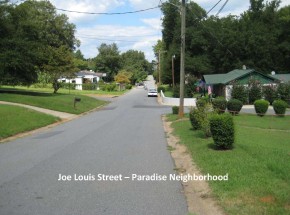
Close to 20 residents showed up at Bethlehem Baptist Church in the town’s historic Paradise neighborhood to ask questions and provide feedback about a program that could land hundreds of thousands of dollars for community improvement.
“I thought it was a good turnout,” said Robby Moody, regional director of the Catawba Regional Council of Governments.
Moody gave the audience an overview of the Community Development Block Grant program in which the federal government provides money to states to award local municipalities that propose various improvement projects. For Mill won $25,000 to put together its plan. The town contributed an extra $2,500 and contracted with the COG to guide the process.
Fort Mill will be competing with towns and cities from across South Carolina for a $350,000 renewable grant that’s funded by the U.S. Dept. of Housing and Urban Development.
One woman in the audience asked how officials are notifying residents about these information meetings and was concerned after Moody told her the town is relying on local media and churches to spread the word.
“Not everybody reads the newspaper or goes to church,” she said.
Another audience member, Lisa Faircloth, who lives in Fort Mill, though not in Paradise, said, “the people that are being impacted the most must not be left out because they don’t know about the meeting.”
During the meeting, residents were asked to fill out a survey that rates a variety of quality of life issues, from housing status and local government, to public transportation. Many balked, saying they weren’t sure how the data would be used and if it’s relevant. Moody said anyone who wasn’t comfortable filling out the survey shouldn’t feel pressured about it.
Residents also had an opportunity to come to the front of the room and write on a board improvements they would like to see. The list included repairing pot holes, fixing storm drains, parks, affordable housing, public safety and street lights.
Moody said one task ahead is getting residents oriented with what the town can can’t do with the grant money. The potential projects will have to be detailed in the final application.
“There was a little bit concern by neighbors about housing not being an eligible activity under the grant and I did my best to explain that, but I think it’s a lingering question folks have,” Moody said. “But it’s just not eligible under the CDBG grant program, so we’re going to recommend looking at other sources of funding [for housing] – primarily faith-based initiatives and I gave them some examples.”
He also said the fact that “people care and they definitely want to share their ideas,” is a major part of the process.
“That’s 90-plus percent, just to get folks interested,” Moody said.

 (803) 327-9041
(803) 327-9041
